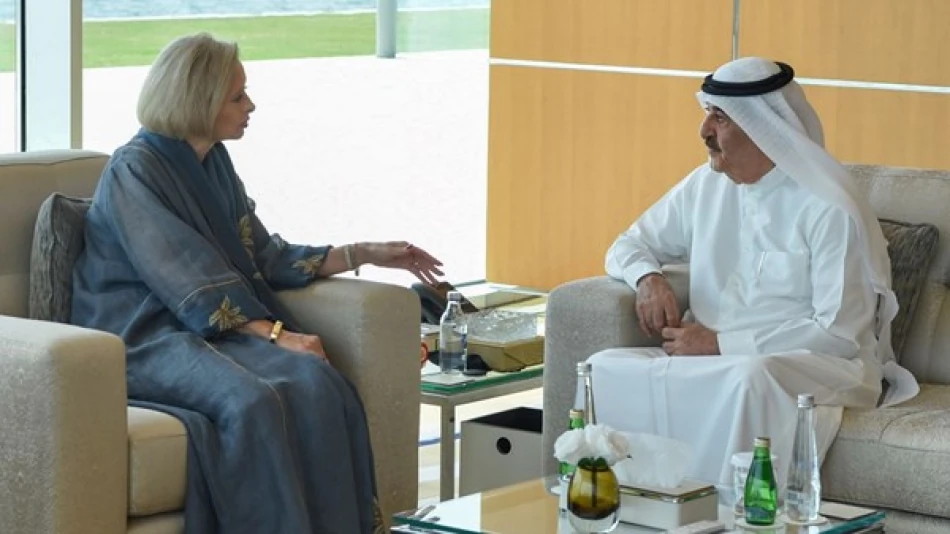
Emirati Ruler Welcomes US Ambassador to Strengthen Bilateral Ties
UAE-US Diplomatic Ties Strengthen as American Ambassador Concludes Strategic Mission
The completion of US Ambassador Martina Strong's diplomatic mission in the UAE marks another milestone in the deepening strategic partnership between Washington and Abu Dhabi, as regional leaders emphasize the growing importance of bilateral cooperation across economic, security, and technological sectors. Her farewell meeting with Umm Al Quwain's ruler underscores how even smaller emirates play crucial roles in America's Gulf strategy.
High-Level Farewell Signals Diplomatic Success
Sheikh Saud bin Rashid Al Mualla, Supreme Council Member and Ruler of Umm Al Quwain, received Ambassador Martina Strong at his office for her farewell visit, with Deputy Ruler Sheikh Ahmed bin Saud bin Rashid Al Mualla in attendance. The meeting reflected the protocol significance the UAE places on US diplomatic relations, even as Strong prepares to transition to new responsibilities.
During the encounter, Sheikh Saud emphasized the depth of bilateral relations between the UAE and United States, highlighting both nations' commitment to strengthening cooperation that serves their mutual interests and benefits both peoples.
Strategic Partnership Beyond Traditional Boundaries
The ruler praised Strong's efforts in enhancing cooperation between the two countries across various sectors, suggesting her tenure coincided with expanded collaboration beyond traditional defense and energy partnerships. This likely included emerging areas such as artificial intelligence, space technology, and clean energy – sectors where the UAE has positioned itself as a regional hub.
UAE's Global Recognition Strategy
Ambassador Strong's response highlighted a key aspect of UAE's international positioning. She noted that the country has achieved sustainable developmental successes and accomplishments that have made it the focus of global attention. This observation aligns with the UAE's deliberate strategy to become a bridge between East and West, particularly as US foreign policy increasingly focuses on great power competition with China.
Implications for US Gulf Strategy
Strong's successful mission comes at a critical time for American interests in the Gulf region. The UAE has emerged as Washington's most reliable partner for regional stability initiatives, from the Abraham Accords to counter-Iran policies. Her work likely included coordinating on sensitive issues such as sanctions enforcement, regional security cooperation, and economic diversification support.
Economic Dimensions
The timing of this diplomatic transition is significant given the UAE's role as a major destination for American investment and a gateway for US companies entering Middle Eastern and South Asian markets. With bilateral trade exceeding $24 billion annually, Strong's tenure likely focused on expanding commercial ties beyond traditional energy sectors into technology, healthcare, and financial services.
Looking Forward
As Strong departs, her successor will inherit a relationship that has evolved from simple security cooperation to comprehensive strategic partnership. The challenge ahead involves maintaining momentum on initiatives ranging from climate change cooperation to space exploration, while navigating complex regional dynamics involving Iran, Saudi Arabia, and Israel.
The formal nature of her farewell tour, including meetings with rulers of individual emirates, demonstrates how the US has learned to work within the UAE's federal structure to maximize diplomatic effectiveness. This approach has proven essential for American interests in a region where personal relationships often determine policy outcomes.
Most Viewed News

 Layla Al Mansoori
Layla Al Mansoori






